
Wilt
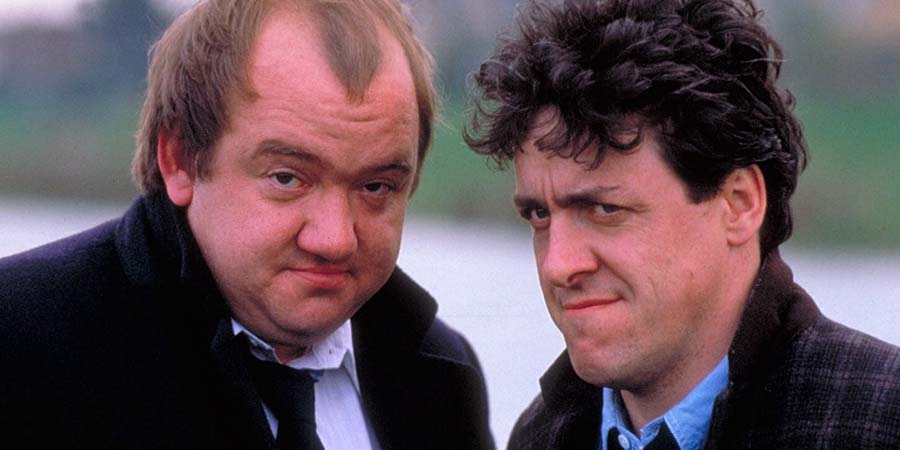
It was literally a rude awakening.
Wilt (Griff Rhys Jones) woke to find himself both stark naked and inextricably attached to a full-sized adult sex doll. Over the next few minutes, we see him resorting to a number of increasingly desperate measures to get out of his predicament either by detaching himself or bursting the doll.
For Henry Wilt is in serious trouble. He is not in the privacy of his own home but is in a room in a house where a large party is being held. The party has been thrown by Sally (Diana Quick), keen social climber and friend of Henry's wife, Eva (Alison Steadman). It is Sally who has arranged for Henry to get into this awkward position in the first place, attaching Henry to the doll as a spiteful gesture while he was unconscious, following an accident. Needless to say, the situation does not work out well for Henry. By the end of the party, he will have experienced public humiliation as his predicament is exposed to the other partygoers (including his tearful wife). But that's just the start of his problems. Soon afterwards, he will find himself hauled before one Inspector Flint of the police (Mel Smith) on a murder charge.
Henry's awkward situation with the doll was placed at the centre of the publicity for the 1989 cinema release, Wilt (the film was released as The Misadventures Of Mr. Wilt in the USA). We will discuss it further in a moment, but first we'll take a look at the two men who starred in it, namely Melvyn Kenneth Smith and Griffith Rhys Jones.
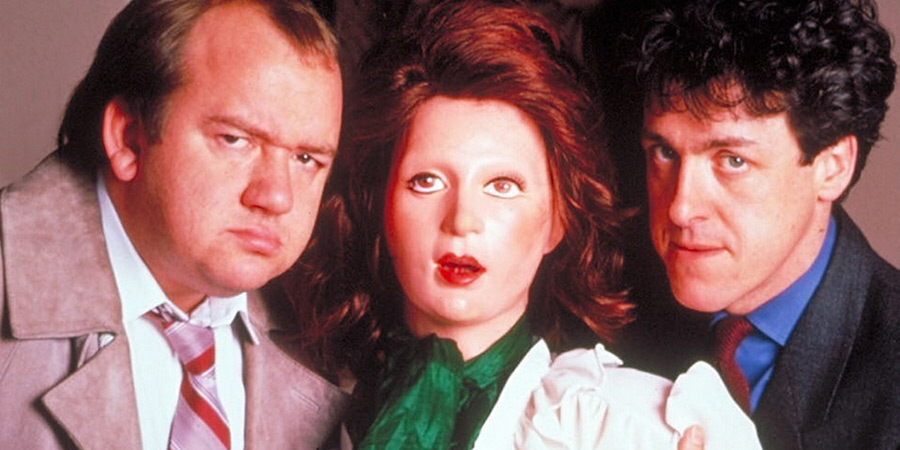
By 1989, Mel Smith and Griff Rhys Jones were one of the most famous and successful comedy double acts in the land. They had first found fame a decade earlier, alongside Rowan Atkinson and Pamela Stephenson, in the now legendary sketch show Not The Nine O'Clock News.
When NTNON ended in 1982, the four went their separate ways. Atkinson starred in Blackadder, followed by Mr. Bean. Stephenson joined the team on America's Saturday Night Live, appeared in Superman III and had many comedy adventures. By the end of the decade, however, she seemed to be moving away from comedy and was studying clinical psychology.
Mel and Griff, meanwhile, had paired up and continued to do sketches, much as they had before. Their TV sketch show, Alas Smith & Jones (a play on the title of the now mostly forgotten Seventies western series, Alias Smith And Jones), ran for four series on BBC Two from 1984 until 1988, before dropping the 'Alas' and continuing on BBC One as Smith & Jones for a further decade.
Neither was each other's straight man: both were equally funny and adept at playing a wide range of characters. Jones was Welsh, usually lean and dark-haired. Smith was a Londoner, of stockier build and balding with red-hair. Behind the scenes, Smith was easily the more laidback of the two. Smith could usually be found either smoking a cigar or scouring the racing pages of the newspaper.
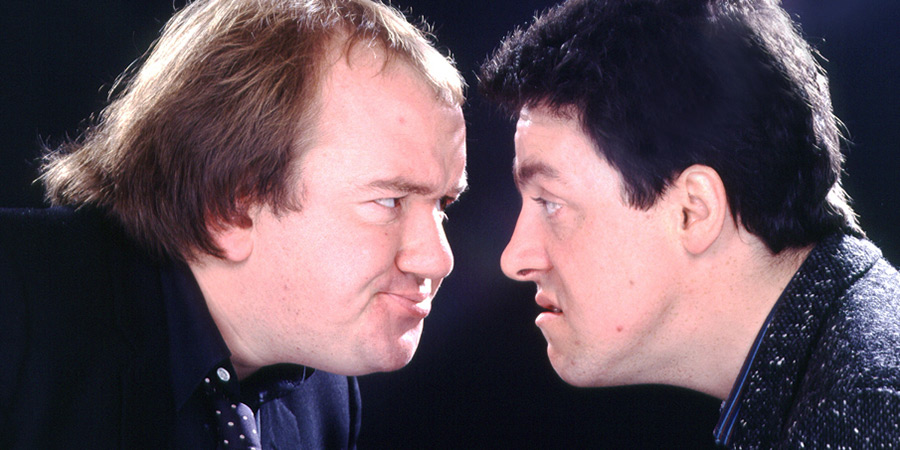
Their most famous sketches saw them facing each other head-to-head against a pitch-black background, Smith adopting the guise of a stupid man explaining something to his even stupider friend. Subjects included relating the experience of visiting a sperm bank, the ins and outs of faking an orgasm (Rhys-Jones: "how do you do that then?") and the curse of male impotence (which Rhys-Jones describes as "a problem in the old southern region"). These sketches, which owed something to Pete & Dud from twenty years before, soon became the duo's trademark.
Another sketch saw them playing two skinheads apparently harassing train passengers for money, until it was finally revealed they were, in fact, ticket inspectors ("single to Penge, please"). Another saw Jones as a newsreader grimly announcing an imminent nuclear attack, only to be interrupted by a further 'EastEnders newsflash' in which Smith's character reassured viewers: "don't worry - the dog's okay!".
Significantly, a number of their sketches saw both men playing policemen, often in scenarios where they were extracting confessions from suspects. In 1985, for example, they dressed as policeman to introduce Queen to the stage for their celebrated performance at Live Aid.
As the Eighties neared their end, both men were in their late thirties and were keen to break into films. Working alone, Smith had enjoyed some success in this field already nabbing a small part in 1987's cult fantasy adventure The Princess Bride, and directing a cast, which included their old co-star Rowan Atkinson, in 1989's The Tall Guy. But significantly their only previous attempt to star in a film together, 1985's misfiring sci-fi comedy Morons From Outer Space had proven to be a critical and commercial disaster. How could they be sure of not making the same mistake again?
The solution seemed to lie within the pages of one particular novel, Wilt, by Tom Sharpe, which had been published back in 1976, before Smith & Jones had even met each other.
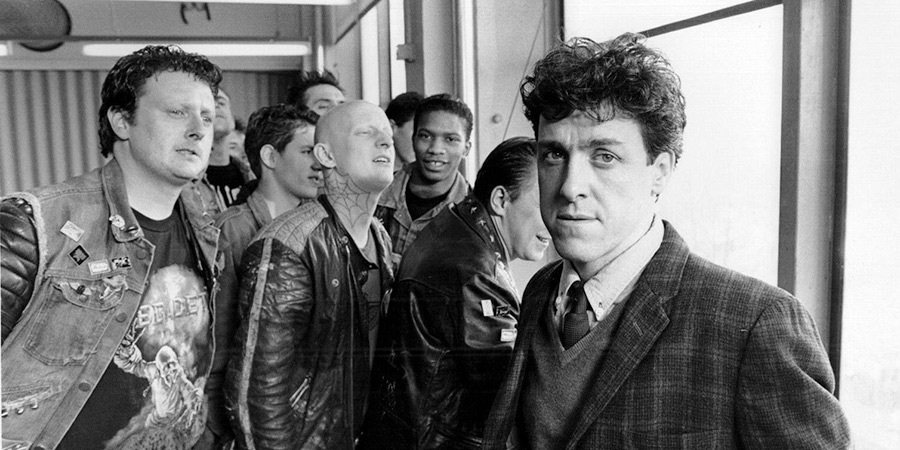
The book tells the story of Henry Wilt who, as the novel opens, finds himself in a serious rut in both his professional and personal life. At work, he is deeply frustrated by his job at an East Anglian adult education college teaching English Literature to a class of apprentice butchers. The butchers don't want to be there. They have no interest in Thomas Hardy and are only there to fulfil the requirements of their apprenticeship. However, to Wilt's colleagues, the very fact that he has been content to persist in such a thankless task for over a decade without complaint seems in itself to suggest a lack of ambition which effectively rules him out for promotion.
At home, his wife Eva complains about his lack of drive and immerses herself in an endless series of New Age and martial arts themed evening classes to distract herself from her boring, sexless marriage and cynical downtrodden husband.
Wilt himself takes out his frustrations by walking the dog and plotting Eva's murder. But things soon go very badly. A bizarre combination of events centred around Wilt's frenzied, drunken attempts to dispose of the sex doll after the disastrous party and Eva Wilt's disappearance round about the same time, lead him to be accused of murder. His interrogation is conducted by the irritable Inspector Flint.
Flint is absolutely convinced that in Wilt they have got their man. Wilt's sense of superiority and refusal to confess to a murder, which Flint feels absolutely certain he is right about, drives the detective into a fury.
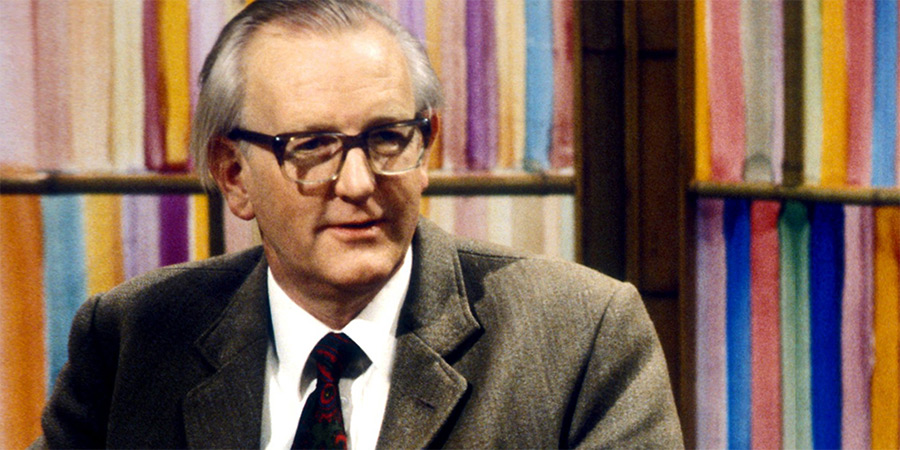
Wilt was in fact just one of the eleven bestselling books written by brilliant comic author Tom Sharpe between 1971 and 1984. Wilt, which drew heavily on Sharpe's own teaching experiences in fact spawned two sequels, The Wilt Alternative (1979) and Wilt On High (1984). Regardless of whether they are sending up the absurdities of Apartheid South Africa, the hypocrisy of the rich or the excesses of the permissive society, his novels remain highly readable today.
By 1984, however, Sharpe, who was by then in his fifties, had grown deeply frustrated with the publishing industry (something indicated by his 1977 satire, The Great Pursuit) and had given up writing. Happily, in 1995, he started up again, producing five more novels - including two more Wilt ones - up until 2010.
During that eleven-year gap, however, a number of Sharpe's finest books were adapted for the screen. Blott On The Landscape (1985) starred David Suchet as Blott, an eccentric gardener who becomes involved in a spirited campaign to save a local beauty spot from being "developed" by bondage-obsessed Tory MP, Sir Giles Lynchwood (George Cole).
Two years later, Ian Richardson, John Sessions and an aged-up Del Boy era David Jason starred in Porterhouse Blue, a Channel 4 adaptation of Sharpe's classic novel about political shenanigans at an ancient Cambridge University college.
Both of these TV versions of Sharpe's books had been adapted by Malcolm Bradbury, himself a distinguished novelist turned screenwriter who had written the university satire The History Man in 1975. Both of Bradbury's Sharpe adaptations had been popular and well-received. Griff Rhys-Jones had even had a smallish part in Porterhouse Blue as Cornelius Carrington.
Now Jones and Smith were starring in a big screen version of Wilt, directed by Michael Tuchner, who had helmed the acclaimed Jack Rosenthal TV comedy drama Bar Mitzvah Boy back in the Seventies.
With Malcolm Bradbury now unavailable (he was scripting his own Euro-centric comedy drama, The Gravy Train, starring Ian Richardson and future double Academy Award winner Christoph Waltz) who would adapt this one? On the small screen, Smith & Jones relied on a large and talented pool of writers including Clive Anderson, Graham Linehan, Arthur Mathews, Andy Parsons, Guy Jenkin, Andy Hamilton, Chris Langham, John O'Farrell and Paul Merton. Wilt's screenplay was co-written by Andrew Marshall and David Renwick.
Best known for writing Eighties sitcom satires, Whoops Apocalypse and Hot Metal at the time, Marshall would soon be known as the creator of Belinda Lang/Gary Olsen sitcom, 2point4 Children while Renwick would write One Foot In The Grave and, later, Jonathan Creek. How would this team fare with the film version of Wilt?
Without wishing to spoil the plot of either the book or the film, it is fair to say quite a few changes were made to Wilt in the transition from page to screen. The character of Inspector Flint doesn't appear until quite late in the novel, but is given a slightly larger role in the film to help ensure Smith & Jones achieve something close to equal billing. These changes work. The chemistry between the leading duo is the film's chief asset and the scenes with them together are generally the most successful in the film.
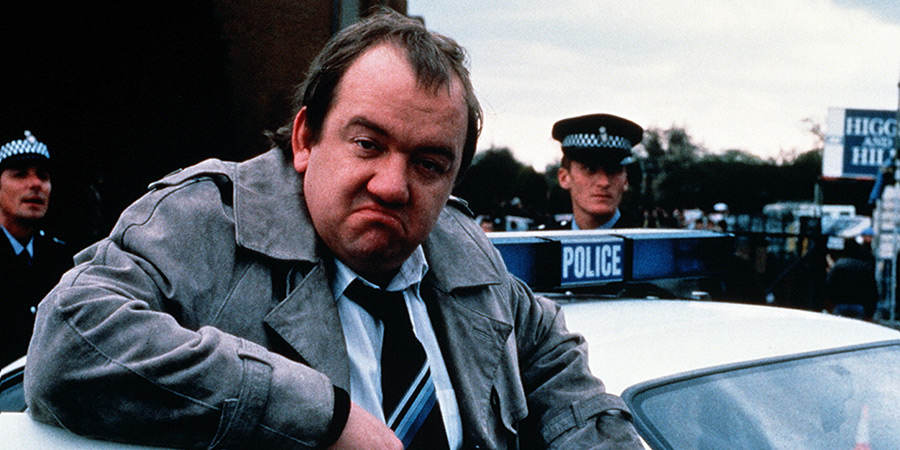
Wilt is an infuriating, often pedantic character who frequently drives Flint up the wall. As Wilt is led away by the police, one of his students shouts his support: "Don't tell the bastards nothing!".
"'Anything', Cranham!" Wilt replies, unable to stop himself from correcting his grammar. "Don't tell the bastards anything!"
Flint loses his patience with Wilt frequently, lambasting him as both "a gormless erection" and a "cretinous testicle". He is especially outraged to learn that Wilt has thrown away a crucial letter from Eva after inadvertently using it as toilet paper. "Do you mean to say that the one piece of evidence that could corroborate your story is wrapped round a turd halfway to the North Sea?" he asks.
The screenplay also makes the circumstances surrounding Eva's disappearance rather more mysterious than they are in the book, something which benefits the overall story. To modern readers, the book's attitude to Eva Wilt's size has probably dated the novel, but in the film she is not overweight.
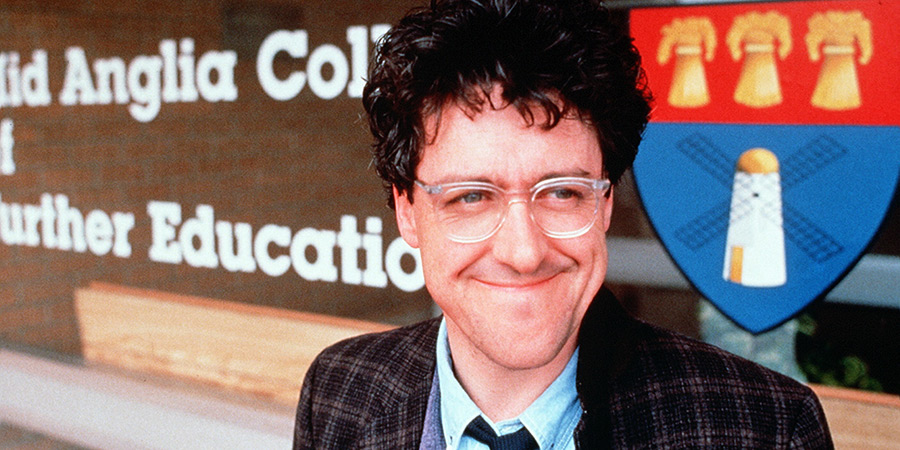
Less good are the changes made to the later stages of the script, such as the introduction of the Swaffham Strangler (David Ryall). The script also saps much of the satirical elements from the novel and is, in truth, probably the weakest of the three Tom Sharpe adaptations made during the second half of the Eighties.
But it remains good fun. Smith, Jones and Steadman are all great in the main roles. Keen-eyed viewers may spot comedy regulars Geoff McGivern, Josephine Tewson and Roger Lloyd Pack amongst the smaller parts. Rising star Gina McKee also makes a brief appearance as a spaced-out party guest while long-time Northern Irish Coronation Street actor Charles Lawson crops up as one of the yobs in Wilt's class. Veteran actors Diana Quick and Roger Allam also make an impact in fairly early roles.

Wilt was not a flop and spent one glorious week at the top of the UK film charts. However, it did no real business in the US (where Smith & Jones remain unknown) and had little real cultural impact overall. The stars carried on much as before. In 1998 they sold Talkback, the production company they had set up in 1988, for £62 million.
It is probably significant, however, that while Smith & Jones remained friendly and worked together for many more years, they never appeared in a film together again.
Interestingly, one of Rhys-Jones's few other film roles was in Martin Clunes' 1994 directorial debut, Staggered, which centres on Clunes' character's struggle to get home after being left naked and deserted on a remote Scottish island following an unusually wild stag party. Although generally disappointing, the film has a number of similarities to Wilt, for example in its "man wakes up in an awkward situation after being tricked during a wild party" premise. Rhys-Jones also provides the comic high point of the film, partly as a result of once again exposing his buttocks on screen.
Smith, meanwhile, continued to direct. Not all his films were successful (Radioland Murders, High Heels And Low Lifes and Blackball all failed), but in 1997, he scored a massive box office success by reuniting with another of his Not The Nine O'Clock News cohorts. Bean - The Ultimate Disaster Movie was a huge hit.
The summer of 2013 brought two items of Wilt-related bad news. June saw the death of Tom Sharpe at the age of 85. Perhaps more shocking was the announcement of Mel Smith's demise following a heart attack at the age of 60, just six weeks later.
For all their many successes Smith & Jones had never truly become full-blown stars of the silver screen together. Now, however, their great comedy double act was over, once and for all.
Help us publish more great content by becoming a BCG Supporter. You'll be backing our mission to champion, celebrate and promote British comedy in all its forms: past, present and future.
We understand times are tough, but if you believe in the power of laughter we'd be honoured to have you join us. Advertising doesn't cover our costs, so every single donation matters and is put to good use. Thank you.
Love comedy? Find out moreWilt

Henry Wilt spends his evenings walking his dog and fantasising about murdering his domineering wife, Eva. Whilst incredibly drunk at a party, Wilt's entanglement with a life-size inflatable doll ends with him dumping it in a convenient hole at a building site. The following morning, when Eva cannot be found, Wilt's activities attract the suspicion of the dogged Inspector Flint of Norwich CID, who firmly believes that Mrs Wilt is now pushing up twenty tons of pre-mixed concrete...
Griff Rhys Jones and Mel Smith star as the hapless Wilt and his single-minded pursuer in this classic comedy film, adapted from Tom Sharpe's outrageously funny novel by Andrew Marshall and David Renwick. Co-starring Alison Steadman and Diana Quick, Wilt is presented here as a brand-new high definition transfer from the original film elements in its original theatrical aspect ratio.
First released: Monday 10th February 2020
- Distributor: Network
- Region: B
- Discs: 1
- Minutes: 93
- Subtitles: English
- Catalogue: 7958236
![]() Buy and sell old and new items
Buy and sell old and new items
Search for this product on eBay
BCG may earn commission on sales generated through the links above.
- Distributor: Network
- Region: 2
- Discs: 1
- Minutes: 89
- Subtitles: English
- Catalogue: 7956029
![]() Buy and sell old and new items
Buy and sell old and new items
Search for this product on eBay
BCG may earn commission on sales generated through the links above.
Tom Sharpe - Wilt

Henry Wilt has for ten years been trying to teach English literature to his students at the Fenland College of Arts and Technology. He has become bored, frustrated and possibly murdereous, so Chief Inspector Flint suspects the worst when Henry's wife Eva goes missing.
First published: Monday 1st March 1976
- Published: Thursday 7th November 2002
- Publisher: Arrow Books
- Pages: 336
- Catalogue: 9780099435488
![]() Buy and sell old and new items
Buy and sell old and new items
Search for this product on eBay
BCG may earn commission on sales generated through the links above.
- Published: Thursday 26th May 2011
- Publisher: Cornerstone Media
- Download: .37mb
BCG may earn commission on sales generated through the links above.
- Publisher: Martin Secker & Warburg
- Pages: 211
- Catalogue: 9780436458040
![]() Buy and sell old and new items
Buy and sell old and new items
Search for this product on eBay
BCG may earn commission on sales generated through the links above.

